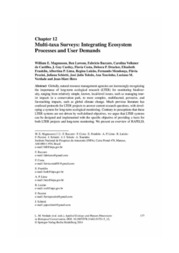Multi-taxa surveys: integrating ecosystem processes and user demands.
Multi-taxa surveys: integrating ecosystem processes and user demands.
Autoria: MAGNUSSON, W. E.; LAWSON, B.; BACCARO, F.; CASTILHO, C. V. de; CASTLEY, J. G.; COSTA, F.; DRUCKER, D. P.; FRANKLIN, E.; LIMA, A. P.; LUIZÃO, R.; MENDONÇA, F.; PEZZINI, F.; SCHIETTI, J.; TOLEDO, J. J.; TOURINHO, A.; VERDADE, L. M.; HERO, J-M.
Resumo: Globally, natural resource management agencies are increasingly recognizing the importance of long-term ecological research (LTER) for monitoring biodiversity, ranging from relatively simple, known, local-level issues, such as managing tourist impacts in a conservation park, to more complex, multifaceted, pervasive, and far-reaching impacts, such as global climate change. Much previous literature has confused protocols for LTER projects to answer current research questions, with developing a system for long-term ecological monitoring. Contrary to perceptions that these LTER systems are not driven by well-defined objectives, we argue that LTER systems can be designed and implemented with the specific objective of providing a basis for both LTER projects and long-term monitoring. We present an overview of RAPELD, an LTER system developed in Brazil, with comparable infrastructure established in Australia and Nepal. The standardized biodiversity infrastructure and research platform provides a long-term basis for powerful multi-disciplinary, multi-scale analyses.
Ano de publicação: 2014
Tipo de publicação: Parte de livro (capítulos de livros, trabalhos e resumos publicados em anais ou em coletâneas)
Unidade: Embrapa Territorial
Palavras-chave: Monitoring biodiversity, Natural resources
Observações
1 - Por padrão são exibidas publicações dos últimos 20 anos. Para encontrar publicações mais antigas, configure o filtro ano de publicação, colocando o ano a partir do qual você deseja encontrar publicações. O filtro está na coluna da esquerda na busca acima.
2 - Para ler algumas publicações da Embrapa (apenas as que estão em formato ePub), é necessário ter, no celular ou computador, um desses softwares gratuitos. Sistemas Android: Google Play Livros; IOS: iBooks; Windows e Linux: software Calibre.
Acesse outras publicações
Acesse a Base de Dados da Pesquisa Agropecuária (BDPA) para consultar o acervo completo das bibliotecas da Embrapa.

